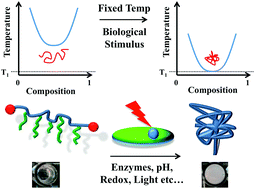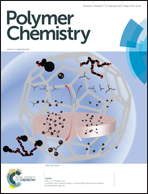Towards being genuinely smart: ‘isothermally-responsive’ polymers as versatile, programmable scaffolds for biologically-adaptable materials
Abstract
Responsive polymers have found diverse application across polymer, biomaterials, medical, sensing and engineering fields. Despite many years of study, this has focussed mainly on those polymers which undergo thermally-induced changes – either a lower or upper critical solution temperature. To rival the adaptability of Nature's macromolecules, polymers must respond in a ‘smarter’ way to other triggers such as enzymes, biochemical gradients, ion concentration or metabolites, to name a few. Here we review the concept of ‘isothermal’ responses where core thermoresponsive polymers are chemically engineered such that they undergo their useful response (such as coil-globule transition, cell uptake or cargo release) but at constant temperature. This is achieved by consideration of their phase diagram where solubility can be changed by small structural changes to the end-group, side-chain/substituents or through main chain modification/binding. The current state-of-the-art is summarised here.



 Please wait while we load your content...
Please wait while we load your content...